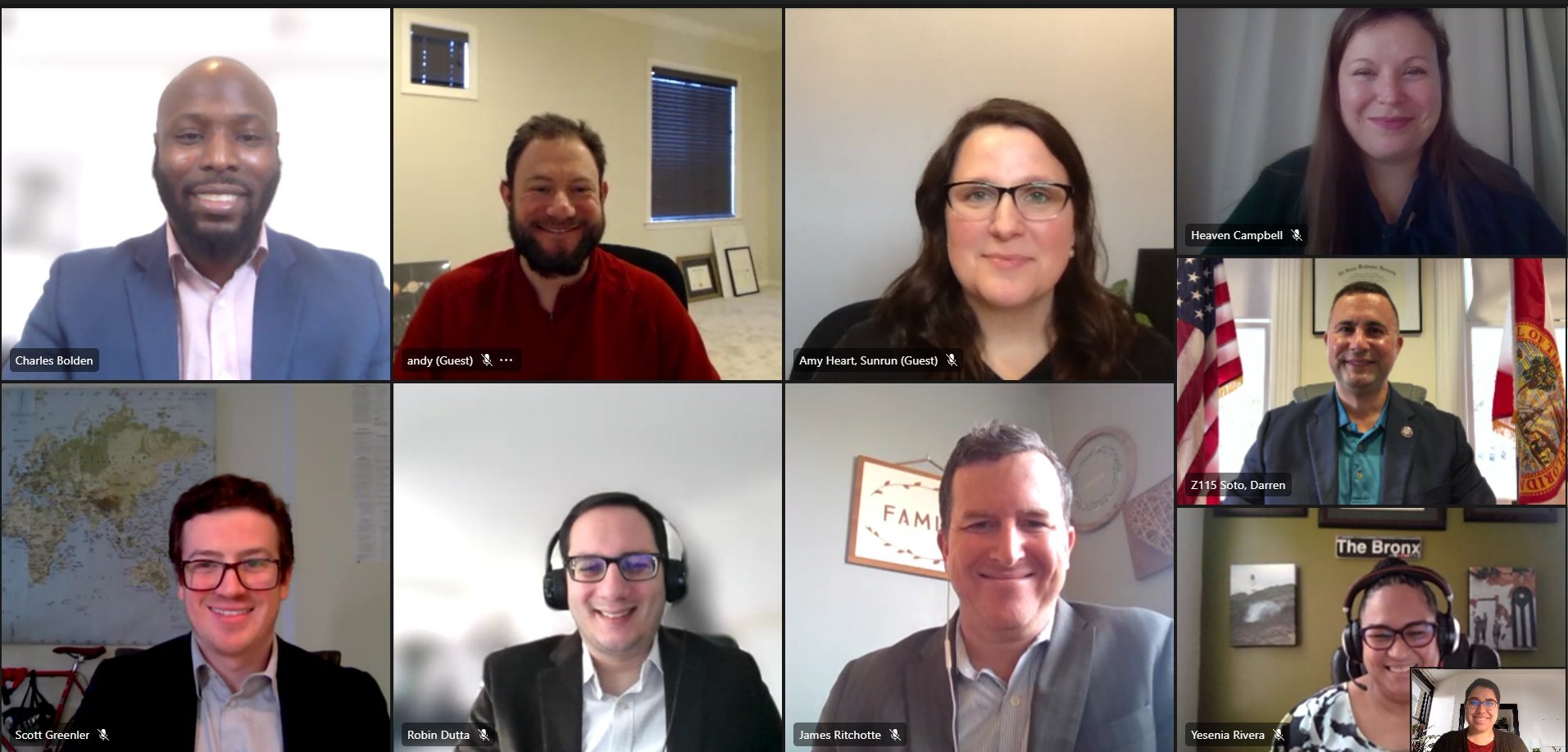Five Ways Congress Can Advance Environmental Justice with Smart Clean Energy Policies
 Representative Darren Soto (FL-19) meets with representatives from SEIA and Solar United Neighbors.
Representative Darren Soto (FL-19) meets with representatives from SEIA and Solar United Neighbors.
As Congress considers historic investments in clean energy policies, they have an unprecedented opportunity to push for bold public policies that benefit Americans in every zip code.
To highlight the critical role environmental justice plays in climate and energy policy discussions, the Solar Energy Industries Association (SEIA) teamed up with Solar United Neighbors (SUN) to meet with 14 members of Congress on this important topic.
Black and minority communities continue to experience the effects of environmental racism and are bearing the brunt of climate change impacts. Coupled with underrepresentation in the clean energy industry and slower adoption rates, the new policies we create must expand clean energy use and ensure every community has access to the jobs and opportunities we create.
Clean energy can be a powerful tool in combatting environmental injustices, and SEIA and its allies are pushing for smart policies that equitably grow the clean energy economy.
Here are five ways Congress can support environmental justice in its clean energy policies.
Extend the Solar Investment Tax Credit (ITC) with Direct Pay and Refundability
Cutting carbon emissions and creating good-paying jobs are essential for communities that are disproportionately harmed by climate change. The solar Investment Tax Credit (ITC) is a proven job creator that can quickly add billions of dollars to our economy and encourage new business growth. This policy would jumpstart solar deployment and help us significantly reduce the nation’s carbon footprint with new large-scale projects.
Direct pay will enable businesses to receive the benefits of the ITC upfront, helping to reduce the industry’s reliance on tax equity markets that have tightened during the pandemic. This can be a gamechanger for the many small businesses operating throughout the solar industry.
In addition, refundability of the ITC for rooftop solar customers will make the tax credit less reliant on a person’s taxable income. This will greatly improve rooftop solar accessibility and help more low- and moderate-income families experience the cost-saving benefits of rooftop solar.
ITC Plus-Ups in Communities That Need Them Most
We can also encourage more solar development in lower income communities and on Native American lands by providing bonus tax credits for qualifying solar projects. Similarly, we could also provide bonus credits for fossil fuel communities that are experiencing plant closures, helping to provide a just clean energy transition and new economic opportunities in the places that need it most.
Promote Environmental and Climate Justice Through Block Grants
Communities that have struggled with environmental justice concerns need strong investments to recover, rebuild, and prosper. Environmental and Climate Justice Block Grants can help address persistent environmental and health hazards by supporting community-led priorities. This funding can help to reduce pollution, improve public health, and promote climate-readiness so disadvantaged communities can transition to a safer and cleaner energy economy.
Fund the Civilian Climate Corps
A Civilian Climate Corps would train thousands of workers to help address the threat of climate change and boost community resilience. This program would create 300,000 new employment opportunities with fair pay and good benefits, all in service of protecting their communities from the worst impacts of climate change.
Clean energy is a core part of our answer to climate change, and this program could help to direct many young and motivated Americans to the solar and storage industry.
Invest in Workforce Development
Over the next decade, the solar industry is poised to welcome hundreds of thousands of diverse voices to the renewable energy sector, including more women and people of color. Workforce development programs must provide 21st century training that helps to connect Americans to good-paying jobs that also satisfy the needs of clean energy employers. In addition, we must also expand clean energy apprenticeship programs so even more Americans can get hands on, experiential training.
SEIA is committed to its environmental justice priorities, and continues to advocate for these policies every step of the way. At stake are strong clean energy policies that can promote equity, create hundreds of thousands of jobs in every community, and address the climate crisis.
Now it’s up to Congress to make sure these policies make it into the next iteration of the president’s energy and infrastructure agenda.
Learn more about the key environmental justice policies in the Build Back Better agenda.

